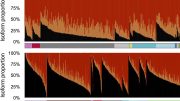
Researchers from the University of Eastern Finland have discovered plasma protein biomarkers that can pinpoint adolescents at risk for mental health issues, paving the way for advancements in early detection and prevention. The study, conducted by Professor Katja Kanninen’s group, found 58 proteins significantly associated with mental health risk, using a novel algorithm to create predictive models.
Scientists from the University of Eastern Finland have discovered biomarkers in plasma proteins that can identify teenagers who may be prone to developing mental health disorders. These findings were published in Nature Mental Health.
With an estimated 10-20% of adolescents facing mental health challenges, the majority of which go undiagnosed and untreated, there is an urgent need for new early detection methods. These innovative indicators could potentially transform the way mental health issues are identified and prevented in young people in the future.
In the study carried out in the research group of Professor Katja Kanninen, the researchers used self-reported Strengths and Difficulties Questionnaire (SDQ) scores to evaluate mental health risks in participants aged between 11 and 16 years. Blood sample analyses showed that 58 proteins were significantly associated with the SDQ score.
Bioinformatic analyses were used to identify the biological processes and pathways linked with the identified plasma protein biomarker candidates. Key enriched pathways related to these proteins included immune responses, blood coagulation, neurogenesis, and neuronal degeneration. The study employed a novel symbolic regression algorithm to create predictive models that best separate low and high SDQ score groups.
According to Professor Kanninen, plasma biomarker studies in mental disorders are an emerging field.
“Alterations in plasma proteins have been previously associated with various mental health disorders, such as depression, schizophrenia, psychotic disorders, and bipolar disorders. Our study supports these earlier findings and further revealed that specific plasma protein alterations could indicate a high risk for mental dysfunction in adolescents,” Professor Kanninen notes.
According to the researchers, this pilot study will be followed by more specific investigations of the potential biomarkers for the identification of individuals at risk of mental health problems, opening a new avenue for advancements in adolescent mental health care.
Reference: “Plasma proteomics discovery of mental health risk biomarkers in adolescents” by Izaque de Sousa Maciel, Aino-Kaisa Piironen, Alexey M. Afonin, Mariia Ivanova, Arto Alatalo, Kaustubh Kishor Jadhav, Jordi Julvez, Maria Foraster, Irene van Kamp and Katja M. Kanninen, 31 July 2023, Nature Mental Health.
DOI: 10.1038/s44220-023-00103-2








Be the first to comment on "Predicting Adolescent Mental Health Issues – Researchers Identify Plasma Biomarkers"